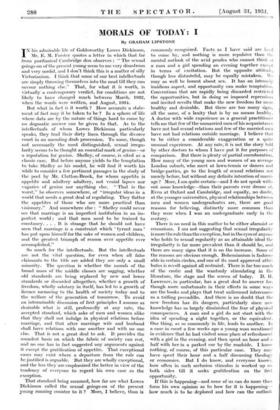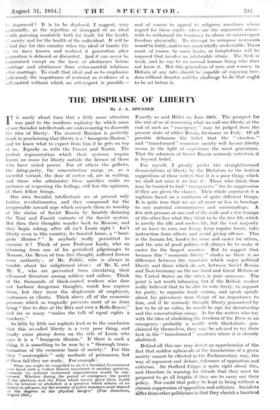MORALS OF TODAY : I
By GRAHAM LIPSTONE
IN his admirable life of Goldsworthy Lowes Dickinson, Mr. E. M. Forster quotes a letter in which that far from puritanical Cambridge don observes : " The sexual goings-on of the present young seem to me very disastrous and very sordid, and I don't think this is a matter of silly Victorianism. I think that some of our best intellectuals are simply throwing themselves into the mud till they can savour nothing else." That, for what it is worth, is virtually a contemporary verdict, for conditions are not likely to have changed much between March, 1932, when the words were written, and August, 1934.
But what in fact is it worth ? How accurate a state- ment of fact may it be taken to be ? In a sphere of life where data are by the nature of things hard to come by no dogmatic answer can be given to that. As to the intellectuals of whom Lowes Dickinson particularly speaks, they trail their dirty linen through the divorce court in an unending drab procession. To some, though not necessarily the most distinguished, sexual irregu- larity seems to be thought an essential mark of genius—or a reputation for genius. Shelley, of course, is cited as a classic case. But before anyone yields to the temptation to take Shelley as his model, he will find it worth his while to consider a few pertinent passages in the study of the poet by Mr. Clutton-Brock, for whom appetite is appetite and adultery adultery, not venial lapses nor vagaries of genius nor anything else. " That is the worst," he observes somewhere, of "irregular ideas in a world that needs a great deal of regulating. They flatter the appetites of those who are more practical than visionary." And somewhere else : " Shelley could never see that marriage is an imperfect institution in an im- perfect world ; and that men need to be trained to constancy. . . . It is strange that he should not have seen that marriage is a constraint which ' tyrant man ' has put upon himself for the sake of women and children, and the greatest triumph of reason over appetite ever accomplished."
So much for the intellectuals. But the intellectuals are not the vital question, for even when all false claimants to the title are added they are only a small minority. The question is whether the morals of the broad mass of the middle classes are sagging, whether old standards are being replaced by new and lower standards or discarded altogether, whether a growth of freedom, wholly salutary in itself, has led to a growth of licence menacing to the health of society today and to the welfare of the generation of tomorrow. To avoid an interminable discussion of first principles I assume as desirable what is still, professedly at any rate, the accepted standard, which asks of men and women alike that they shall not indulge in physical relations before marriage, and that after marriage wife and husband shall have relations with one another and with no one else. That is not a great deal to ask. It provides the soundest basis on which the fabric of society can rest, and no one has in fact suggested any arguments against it except the gratification of appetite. That exceptional cases may exist where a departure from the rule can be justified is arguable. But they are wholly exceptional, and the less they are emphasized the better in view of the tendency of everyone to regard his own case as the exception.
That standard being assumed, how far are what Lowes Dickinson called the sexual goings-on of the present young running counter to it ? More, I believe, than is commonly recognized. Facts as I have said are bard to come by, and nothing is more repulsive than t he mental outlook of the avid prudes who cannot think of a man and a girl spending an evening together except in terms of excitation. But the opposite attitude, though less distasteful, may be equally mistaken. We may as well be honest about sex. It has an intensely insidious aspect, and opportunity can make temptation. Conventions that are rapidly being discarded restricted the opportunities, but in doing so imposed repressions and invited revolts that make the new freedom far more healthy and desirable. But there are too many signs, all the same, of a laxity that is by no means healthy. A doctor with wide experience as a general practitioner tells me that few of the unmarried men of his acquaintance have not had sexual relations and few of the married men have not had relations outside marriage. I believe that to be either a considerable exaggeration or a quite unusual experience. At any rate, it is not the story told by other doctors to whom I have put it for purposes of comparison. But there is plenty of partial corroboration. How many of the young men and women of an average London suburb, who meet at lawn-tennis or dances and bridge-parties, go to the length of sexual relations not merely before, but without any definite intention of marri- age ? More, I am quite certain—and I do not speak with- out some knowledge—than their parents ever dream of. Even at Oxford and Cambridge, and equally, no doubt, at the younger universities, physical relationships between men and women undergraduates are, there are good reasons for believing, distinctly more common than they were when I was an undergraduate early in the century.
There is no need in this matter to be either alarmist or censorious. I am not suggesting that sexual irregularity is more the rule than the exception, but in the eyes of anyone who holds to sexual regularity as an attainable ideal the irregularity is far more prevalent than it should be, and there are many signs that it is on the increase. Some of the reasons are obvious enough. Bohemianism is fashion- able in certain circles, and one of its most approved attri- butes is revolt against all restraint. There is far too much of the erotic and the wantonly stimulating in the literature, the stage and the screen of today. D. H. Lawrence, in particular, has a great deal to answer for, though more unfortunate in their effects in some ways are the books and plays that treat unlicensed intercourse as a trifling peccadillo. And there is no doubt that the new freedom has its dangers, particularly since new knowledge has so largely diminished the fear of physical consequences. A man and a girl do not start with the idea of spending a night together, or the eqUivalent. One thing, as so commonly in life, leads to another. In a case in court a few weeks ago a young man mentioned in evidence that he had visited some place, of refreshment with a girl in the evening, and then spent an hour and a half with her in a parked car by the roadside. I know nothing, of course, of this particular case. They may have spent their hour and a half discussing theology or economics. But I do know, and everyone knows, how often in such seclusion stimulus is worked up on both sides till it seeks gratification on the first opportunity.
If this is happening—and none of us can do more than form his own opinion as to how far it is happening— how much is to be deplored and how can the outlook 1,e improved ? It is to be deplored, I suggest, very profoundly, as the rejection or disregard of an ideal worth pursuing resolutely both for itself, for the health of society and for the health of the individual. It will be a bad day for this country when the ideal of family life ni we have known and realized it generation after generation is debased or discarded. And it can never be maintained except on the basis of abstinence before marriage and abstinence from extra-marital relations after marriage. To exalt that ideal and so to emphasize judiciously the importance of restraint as evidence of a self-control without which no self-respect is possible— and of course to appeal to religious sanctions where regard for them exists—these are the arguments where- with to withstand the tendency to abuse or misinterpret freedom physically. To attempt to reimpose restraints would be futile, and to my mind wholly undesirable. There must, of course, -be some limits, or temptations will be imposed that involve an intolerable strain. The flesh is weak, and he can be no normal human being who does not know it. But this generation of men and women, in Britain, at any rate, should be capable of enjoying free- dorix without disaster and the challenge to do that ought to be set before it.







































 Previous page
Previous page